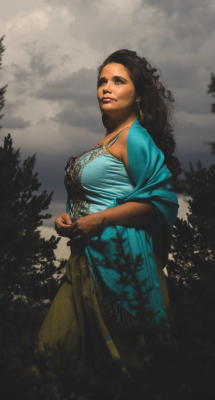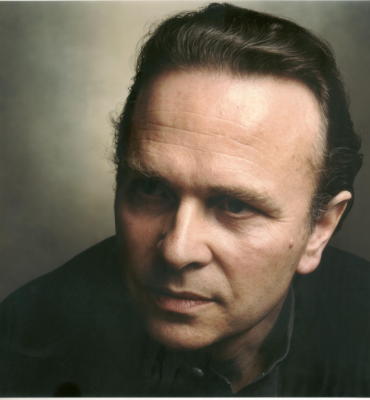|

Sterling Performances
Donizetti's 'Linda di Chamounix',
heard by ROBERT HUGILL
Linda di Chamounix was a late work: Donizetti wrote it in 1842 for Vienna (which also premièred Maria di Rohan the following year) and the revised version was unveiled in Paris later in 1842. The title role was written specifically for the soprano Eugenia Tadolini; Donizetti also wrote Maria di Rohan for her. Interestingly, Tadolini went on to create the title role in Verdi's Alzira in 1845 and would sing a number of other Verdi roles including Odabella (Attila) and Lady Macbeth, which implies that her voice had interesting qualities. Verdi didn't like her Lady Macbeth, describing Tadolini's voice as 'a stupendous voice, clear, limpid, powerful; ... Tadolini's voice has an angelic quality' and he wanted something harsher for the Lady. For the first revival of Linda di Chamounix at Covent Garden since the nineteenth century, the Royal Opera chose the American-Cuban lyric soprano Eglise Gutiérrez who has made quite a name for herself in this repertoire but had not so far appeared in the UK. (She appeared at Wexford in 2005 in Maria di Rohan.) The opera was performed in concert (seen 7 September 2009) conducted by Mark Elder and produced in association with Opera Rara who are recording both performances for issue on CD.
Mark Elder has something of a history with Linda di Chamounix as he conducted the opera in a concert performance given by the Orchestra of the Age of Enlightenment in 1997. Here he conducted a very full Royal Opera House chorus and orchestra, with the orchestra appearing on stage rather than in the pit. Given that they used an acoustic shell on the stage, the results were acoustically extremely satisfactory.
Like other of Donizetti's later operas, Linda di Chamounix has richness and a feeling of development rather greater than in earlier operas, even Lucia di Lamermoor. Listening to Donizetti's final operas (Linda di Chamounix, Caterina Cornaro, Don Pasquale, Maria di Rohan and Dom Sebastien) you wonder where his talent would have taken him if he hadn't had his career cut short by illness and death.
The absence of Linda di Chamounix from regular operatic stages is perhaps a reflection not of its lack of quality but more the super abundance of Donizetti operas combined with the rather dated subject matter; because the opera deals with Linda's virginity and its preservation. Linda (Eglise Gutiérrez) is the daughter of a Swiss peasant. Her farmer father Antonio (Ludovic Tezier) is having trouble with his lease and when the Marquis of Boisfleury (Alessandro Corbelli) offers to help he is grateful. But the local clergyman (Balint Szabo) makes it clear that the Marquis has designs on Linda's honour so she is sent off to Paris with the other boys and girls from the village, who go off every year to earn a living.
Linda has been seeing a young painter, Carlo (Stephen Costello). He turns out to be the Marquis's nephew in disguise. His intentions are honourable, sort of. In Paris he sets Linda up in an apartment and says they will be married, but of course his mother objects. The Marquis tracks her down and offers his own protection; he is rebuffed. But when her father fails to recognise her in her guise as a young noblewoman, she is shaken. When he learns who she is, he fears the worst and curses her. Then the young (male) Savoyard who has travelled with her, Pierotto (Marianna Pizzolato), describes the preparations for Carlo's wedding. It is all too much and Linda loses her mind, in the usual spectacular fashion.
But Linda di Chamounix is an opera semiseria, so we know that it will have a happy ending. The main comic element comes from the Marquis who sings mainly in patter and evokes Dulcanamara and Don Pasquale. Donizetti makes him funny rather than evil; an old man in love can always be funny (and pathetic). In performance Corbelli brought this out beautifully, playing the character for all it was worth but still keeping it within the bounds of the drama; even though he was funny, he was dangerous to Linda's honour.
In Act 3, Linda (still mad) and Pierretto make their way back to Chamounix. Carlo's mother has relented and he has come to Chamounix in search of Linda. If the second act involved a trio of confrontations between Linda and her male tormentors (Carlo, the Marquis, her Father) then these are replayed in reverse in Act 3 and she regains her sanity.
Faced with such a plot, all you can do is take it at face value and give it everything you've got. In fact, the concert performance was something of a relief as goodness knows what a contemporary producer would do to it.

Eglise Gutiérrez
|
The opera needs a diva and Gutiérrez is the real thing. She looked every inch the farmer's daughter in her off-the-shoulder fuchsia pink sequined dress with extensive décolletage. She has a lovely spun silver, velvety voice; it is all beauty of line and gorgeous tone. Her prime virtue was the sense that this line was spun continuously: she provided a beauty of cantilena and a feeling of legato that I have rarely heard. A shallow vibrato brought an attractive tremulousness to the tone. Now, I have to admit that her tone quality was quite distinctive and if you wanted a sharper adjective then I would say that her tone was glutinous.
Her big advantage was that the voice went all the way to the top. Granted the tone thinned somewhat in alt, but you never felt the high notes came from a different voice. This seamlessness of line was allied to a fine technique which meant that we heard a great many ornaments, acuti and cadenzas during the evening. Only a couple of times did she seem less then entirely at home and her coloratura lacked the pin-point accuracy that some divas bring to it.
But Donizetti heroines need a bit of edge as well. It is well enough to convey tremulous passion, but we also want ardour and anger. Her ardour for her lover Carlo was always a little too decorative and her voice rather lacked the edge needed to convey her anger in her scene with the Marquis. Gutiérrez did very well, but the sheer profusion of her technique in some areas made me long for a more complete dramatic performance. This was only a concert performance and Gutiérrez seemed at times content to sketch emotions in whereas a singer like Nelly Miricioiu can turn a mere vocal gesture into a stunning dramatic moment.

Stephen Costello. Photo © Ellen Appel
|
As her lover Carlo, Stephen Costello was quite a find. Philadelphia trained (like Gutiérrez) he had a ringing Italianate voice, with lovely open tones and the ability to convey passion and ardour. Unlike some young tenors he was also willing to sing quietly, which is a great bonus. His manner never really conveyed the passion that his voice indicated. In fact, I rather longed for a producer to come along and develop both Costello and Gutiérrez's performances into fully formed drama.
Costello's career will, I think, develop into singing Verdi and Puccini. His way with Donizetti was very much a twentieth century style, with the voice sung full to the top. There were moments when I would have liked for some interpolated head voice acuti and cadenzas. But faced with such a stunning instrument, it seems churlish to complain.
Costello and Gutiérrez were well supported by the remaining cast. As I have mentioned, Alessandro Corbelli impressed as the Marquis. He gave us an object lesson in how to perform such a part in concert, getting the audience into the palm of his hand. Ludovic Tezier sang beautifully as Linda's father, Antonio. In Act 1 he gave us a beautiful account of his love for his daughter. But when Tezier had to curse her in Act 2, his manner, though firm, lacked the terribleness that was really required.
Pierotto is less a character than a dramatic function; in Act 1 he has to sing a new ballad which acts as a warning to Linda and this becomes something of an idée fixe during the opera. Marianna Pizzolata sang the role beautifully and was the third find of the evening. (Costello is coming back this season but I hope we don't have to wait long before hearing Gutiérrez and Pizzolata.)
Elizabeth Sikora brought her usual commitment and a believably motherly demeanour to the role of Linda's mother. Balint Szabo was the impeccable and rather implacable Calvinist clergyman. Luciano Botelho sang the small role of the Intendant; he has already shown himself capable of more, having sung bigger roles with Holland Park and English Touring Opera.
The logistics of the plot leave something to be desired. At the end of Act 2 Pierotto describes the preparations for Carlo's wedding, which seems to include a bride of his mother's choosing. By Act 3, his mother has changed her mind and the bride had disappeared. (Perhaps she is the subject of another opera: a good aristocratic girl jilted for a common farmer's daughter.) Also in Act 2, Linda's father turns up in Paris. His appearance is necessary to the plot (he needs to doubt her honour and curse her), but this too is more a device than dramatic truth. Then at the opening of Act 3, Carlo needs to give us his side of things but does so in a long duet with the clergyman which concentrates on whether Carlo has trusted to God and has faith in Him. These lacunae also help to make us understand why the opera has dropped out of use -- an opera like Lucia di Lamermoor has barely an ounce or two of fat on the plot, but Linda seems to have a reasonable amount.

Mark Elder. Photo © Sheila Rock
|
Mark Elder and the Royal Opera House forces gave sterling performances in support. The chorus has quite a bit to do in Acts 1 and 3 (Act 2 they had off), including a fair bit of hymn singing. There was also an extra chorus, portraying the young people of the village, though in this case the individual solos from the extra chorus were not always as confident sounding as they could have been.
The orchestra provided a nice feeling of relaxed rubato when accompanying the singers, particularly Gutiérrez. On other occasions in concert performances of this repertoire, balance has been a problem, but here Elder kept everything under control and balance was well nigh perfect.
Whereas some concert performance of operas make you long to see them on stage, this performance did not have me pining for a fully staged version. Instead I will be waiting with baited breath for the Opera Rara CD so that I can listen without worrying too much about the plot. And if you are interested in what Donizetti did next, Opera Rara and the Orchestra of the Age of Enlightenment are performing Maria di Rohan at London's Royal Festival Hall on Saturday 7 November 2009.
Copyright © 9 September 2009
Robert Hugill,
London UK

| 
